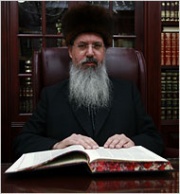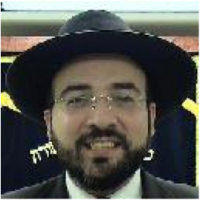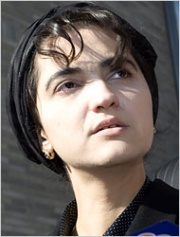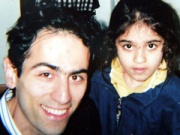Views
Rego Park Homepage | History | Community Information | Contemporary Profile | [A "REal GOod Place to Live" | Creative Accent | Domestic Abuse | Conclusion
Contents |
Domestic Violence in Rego Park
Central Asian Patriarchal Societies[1]

| The flag of Bukhara [2]. |
|---|
The Bukharan Jews emigrated from the Central Asian lands of Uzbekistan, Tajikistan, Kazakhstan, among other countries. All of the lands from which they emigrated, like most countries in the world, were patriarchal societies. Women were expected to respect their husbands and to follow his orders. It was not uncommon for men to use violence against their wives. For this reason, many people referred to the Old Country of Bukharan’s as a “wife-beating society”.
Women were taught and expected to accept their submissive roles within the society. They were instructed not to call in authorities or to complain about their situations. Lana Chanimova Levitin, who is known as the community’s minister of culture, summed up what the women in Bukhara were told in regard to their abusive marriages. She said, “The men would get anger and frustration out at their wives and the next day they would kiss her and bring her flowers. The man wasn’t ostracized. The mother-in-law would say to the wife, ‘aren’t you happy when he buys you something? So he hits you once or twice; it’s not a big deal. If you take his love, you can take his abuse.’”
Coping in a Strange Land
The Bukharans have been immigrating to NYC, and specifically to Rego Park, in very large numbers since the early 1990’s, when the Soviet Union broke up. Unlike many other immigrant groups, Bukharans migrated to the U.S. with their whole families, having been labeled legal refugees. Once in NYC, the husbands and wives begin their search for jobs. Many of the men were professionals and accomplished workers back in Bukhara. However, in NYC, they usually experienced downward mobility. Some men even become unemployed because they refuse to take jobs that they consider to be below their standards. Women on the other hand were less picky when it came to accepting a job. This all in turn created a huge shift in family dynamics. The women on the whole were now the main supporters of the family, with the husband contributing less or even nothing at all to the family budget. The women also had less time to devote to their husbands than they did in the Old Country.
Like all immigrant groups, Bukharans also had to deal with adjusting to the norms of the new land, such as the English language. Although Bukharans migrated with their immediate families, many still had relatives left behind in the Old Country. While learning how to survive in this new country, the men rely even more on their wives than they did in the Old Country. If their wives show them a lack of respect, they can be quick to take their anger and frustrations out on them in the form of abuse. This difficult adjustment to a new land along with the reversal of family roles can create a situation where the Bukharan men who are used to success and power, become abusive. Joseph Berger, a New York Times columnist, quotes a 25-year-old jeweler who said about his wife who was a physical therapist, “How can I live with my wife when she’s making fifteen thousand dollars more than me? She’s going to start commanding me.” These common feelings that are felt by many Bukharan men can quickly turn into violent behavior, especially because of their patriarchal backgrounds[3].
Differing Levels of Occupation among the Sexes
Data from the 2000 census shows the sharply distinct differences between the level of occupations typically held by males and by females in Rego Park. The different percentages of females and males who have professional jobs most clearly expresses this difference. When looking at Social Explorer, you can see that in about half of the census tracts of Rego Park, between 30-40% of males hold professional jobs, and in the other half, between 20 and 30% of males hold professional jobs. In two census tracts, a higher percentage of males hold professional jobs. There are also a few tracts with less than 15% of males holding professional jobs. Although this is a much higher percentage of males with professional jobs than in many other neighborhoods in Queens, it is still considerably less than the percentage of females with professional jobs in Rego Park. Regarding females, there is no census tract with less than 20-30% of females holding professional jobs. In more than half of the census tracts, there are between 30 and 40% of females who hold professional jobs. There are also four census tracts with at least 60% of females holding professional jobs. This shows that in most areas of Rego Park, either an equal amount of men and women hold professional jobs, and in many cases, more women hold professional jobs than men. Even in the areas where equal amounts of women and men hold professional jobs, males may still feel humiliated, because historically men had much higher-level jobs than women, and not equal level jobs. The 2000 census also shows that more men are unemployed than women[4].

| Bukharan woman explaining the issue to Anne Barnard [5]. |
|---|
How Women React to their Abuse
Although women were trained to accept spousal abuse in the Old Country, many women refuse to accept it in America. Like women from many immigrant groups, the Bukharan women feel a greater sense of independence in America. Women are more willing to call the police in the U.S. to report their abusive husbands when back in Bukhara, they would go to Rabbis to discuss family issues[6]. Anne Barnard, a New York Times columnist, quotes Bukharan women who state that they are unwilling to go to Rabbis, like Bukharans traditionally do, because they feel that the Rabbis usually side with the men. Because more Bukharan women are turning to the American legal system and reporting domestic abuse, Bukharan men have become arrested, which has greatly shamed the Bukharan community[7].
Community Leaders Response to the Issue

| Rabbi Yehoshua, Chief Rabbi of Bukharan Jews in America, tries to help many couples. [8]. |
|---|
Although it seems that Domestic Violence is just part of the Bukharan’s culture, the Rabbinic leaders do not endorse this kind of behavior and have taken measures to try and control the growing issue. For example, when a Bukharan male jewelry worker in Rego Park was put in jail for beating his wife, some Rabbis from the Bukharan community went to his house to speak to him after his wife dropped the charges. One such Rabbi was Rabbi Shlomo Nisanov, a Rabbi from a synagogue in Kew Gardens who is considered to be one of the leaders of the Bukharan community. Rabbi Nisanov tried to explain to him the importance of respecting one’s wife and not letting stress turn into violence. The Rabbi explained that in Judaism, if someone raises their hand to anybody, especially their wife or children, then they are considered to be an evil person. He encouraged him to work through misunderstandings with his wife using words and not abuse. This is just one example of Rabbis personally going over to families where they know this issue exists[9].

| Rabbi Nisanov has been very active regarding the issue. [10]. |
|---|
The community has also created seminars and conventions concerning the issue of Domestic Abuse. Richard A. Brown, the Queens District Attorney has helped to arrange some of these conferences. Levitin has also been running workshops through her organization called World of Women immigrants, to teach women about their rights to ensure that they are not taken advantage of. Once engaged, in addition to their other lessons regarding marriage, Bukharan men and women are also taught how to prevent abuse. Men are told to respect their wives and to understand that their wives may work and not be able to take care of them 24/7. Women are also taught to be sensitive to their husbands’ stress and needs. However, they are told that this does not mean that they should accept abuse, even once. Chief Rabbi Yitzchak Yehoshua constantly reminds the Bukharan community that the Torah prohibits all forms of abuse, whether it’s verbal or physical, and that marriage is made up of compromises and discussions, and not abuse. Rabbi Nisanov has said, “We always have this problem, but now the women are speaking out, the rabbis are speaking out, and we’re just not shoving it under the rug like we did before.”
Although Bukharan leaders are aware of the magnitude of the issue facing their community, they are bothered by the fact that the media and newspapers tend to focus on this issue, without ever mentioning all the good aspects of their community. They are disturbed that the media constantly addresses the subject of domestic abuse, while failing to mention the thousands of successful immigrant families, and children who have gone to esteemed colleges. They are fully cognizant that their community needs improvement regarding spousal abuse, however they would also like to at least be acknowledged for achievements such as the Jewish Gymnasium and the $7.3 million Yeshiva in Rego Park[11].
In The News Today

| Mazoltuv Borukhova. [12]. |
|---|
A recent story in the news illustrates the many aspects of this social issue. In March, Mazoltuv Borukhova, and her cousin by marriage, Mikhail Mallayev, were found guilty of first-degree murder of Daniel Malakov, Borukhova’s estranged husband. Dr. Daniel Malakov was an orthodontist, while Dr. Borukhova was an internist. There high levels of educational attainment had brought them much honor within the community. However, now this family has brought shame to the Bukharan community. On October 28th of 2008, Mallayev shot and killed Dr. Malakov in a playground near his office, in front of his 4-yr old daughter Michelle. Mallayev was hired to kill Dr. Malakov by his estranged wife. The couple was in middle of a long custody battle over Michelle. A week before the murder, the judge had given Dr. Malakov temporary custody of Michelle[13].

| Daniel Malakov with his daughter Michelle. [14]. |
|---|
This story has caused many Bukharans to question themselves and the “loss of old ways”. Many Bukharans were personally angry with Borukhova for embarrassing their community. Many couldn’t believe that a Bukharan woman could be guilty of murder. Merik Mordecai, a Bukharan jeweler has said, “women are usually respectful. What is going on with a Bukharan woman to have decided to do a thing like this?” Although Bukharan women are not as submissive to their husbands as they were in the old country, no one expected a Bukharan woman to come to this. Other women are able to relate to Borukhova on some level. Although they say that there is no excuse for murder, they also understand how hard it is to be a Bukharan woman in a male-dominated society and culture. Rafael Nektalov, the editor of the Bukharian Times, a Russian language newspaper for the Bukharan community, has said that the American legal system has undermined the power of the community leaders to successfully deal with these kinds of situations[15]. Leaders of the community, such as Rabbi Yehoshua, had tried to make peace between the couple, but both were unwilling to cooperate and instead turned to the American legal system[16].
This case shows the many differing layers of the particular issue of gender roles and power within the Bukharan community, and how the issue could become more complicated in America. Rabbi Yehoshua told the Jewish Week, “We are a young community in America that is going through a difficult process of adaptation. We have problems, as this terrible case shows, but despite all of that, we are on an upward trajectory; getting better adapted to the Jewish community and American society while striving to maintain out own culture and traditions.”[17]
[18]This video shows some of the Bukharan's reactions to the shooting of Daniel Malakov.
References
- ↑ Berger, Joseph. "The World in a City". Chapter 11: Domestic Disturbances in Rego Park. Ballantine Books. New York 2007.
- ↑ <http://en.wikipedia.org/wiki/Emirate_of_Bukhara>
- ↑ Berger, Joseph. "The World in a City". Chapter 11: Domestic Disturbances in Rego Park. Ballantine Books. New York 2007.
- ↑ <http://www.socialexplorer.com/pub/maps/map3.aspx?g=0,20&mapi=2000%20Census%20Tract&themei=1>
- ↑ Barnard, Anne. "As One of Their Own Is Tried for Murder, Bukharans Debate Loss of Old Ways" The New York Times. February 8, 2009 <http://www.nytimes.com/2009/02/09/nyregion/09dentist.html?fta=y&pagewanted=all>
- ↑ Berger, Joseph. "The World in a City". Chapter 11: Domestic Disturbances in Rego Park. Ballantine Books. New York 2007.
- ↑ Barnard, Anne. "As One of Their Own Is Tried for Murder, Bukharans Debate Loss of Old Ways" The New York Times. February 8, 2009 <http://www.nytimes.com/2009/02/09/nyregion/09dentist.html?fta=y&pagewanted=all>
- ↑ <http://graphics8.nytimes.com/images/2008/02/17/nyregion/rabbi190.jpg>
- ↑ Berger, Joseph. "Old Ways Bring Tears in a New World". The New York Times. March 7, 2003. <http://www.nytimes.com/2003/03/07/nyregion/old-ways-bring-tears-in-a-new-world-immigrants-face-family-violence.html?scp=1&sq=old%20ways%20bring%20tears%20in%20a%20new%20world%20immigrants%20face%20family&st=cse>
- ↑ <http://torahanytime.com/images/Rabbi%20Shlomo%20Nisanov.jpg>
- ↑ Berger, Joseph. "The World in a City". Chapter 11: Domestic Disturbances in Rego Park. Ballantine Books. New York 2007.
- ↑ <http://graphics8.nytimes.com/images/2008/02/08/nyregion/dentist190.jpg>
- ↑ Buckley, Cara. "Doctor is Charged in Killing and her People Bear the Shame". The New York Times. February 17, 2008. <http://www.nytimes.com/2008/02/17/nyregion/17uzbek.html?pagewanted=1&sq=doctor%20is%20charged%20in%20killing%20-%20rego%20park&st=cse&scp=1>
- ↑ <http://www.vosizneias.com/content/2009/03/daniel_malakov.jpg>
- ↑ Barnard, Anne. "As One of Their Own Is Tried for Murder, Bukharans Debate Loss of Old Ways" The New York Times. February 8, 2009 <http://www.nytimes.com/2009/02/09/nyregion/09dentist.html?fta=y&pagewanted=all>
- ↑ Buckley, Cara. "Doctor is Charged in Killing and her People Bear the Shame". The New York Times. February 17, 2008. <http://www.nytimes.com/2008/02/17/nyregion/17uzbek.html?pagewanted=1&sq=doctor%20is%20charged%20in%20killing%20-%20rego%20park&st=cse&scp=1>
- ↑ Walter, Ruby. "For Bukharians, A Split In The Family." The Jewish Week. March 18, 2009. <http://www.thejewishweek.com/viewArticle/c36_a15232/News/New_York.html>
- ↑ <http://www.youtube.com/watch?v=-5cHo-PEC6U&feature=related>